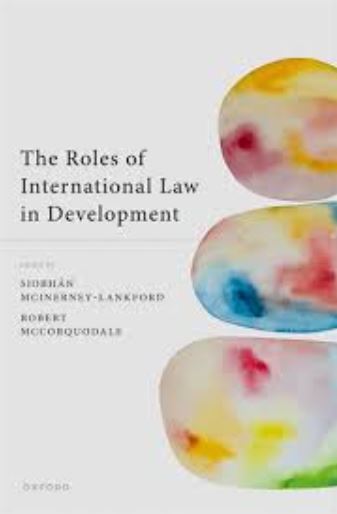#Public International law
Text
How international law significantly changed its scope and depth over the past decades.

This chapter introduces the role of international law in development. It explains that international law and the rule of law are the foundations of the international system, where the rules are essential preconditions for lasting peace, security, economic development, and social progress. The sustainable development goals (SDGs) and social and environmental frameworks of key institutions determine the degree of influence international law has within development. The chapter considers how international law significantly changed its scope and depth over the past decades. It clarifies that SDGs are not legally binding, but they are soft laws intended to change behaviours through implementation in policies and activities and increase international trade.
Read the publication on The Role of International Law in Development: An Introduction
#rule of law#development policy#sustainable development#applicable law#treaty provisions#international law#Public International Law#foundations of the international system#lasting peace#internationasecurity#economic development#social progress.#international trade
0 notes
Text
U.S. v. Ruiz, G.R. No. L-35645, 22 May 1985.
Doctrine
Adjudicative jurisdictionRelates to the jurisdiction of a court to render a judgment in a matter that involves a foreign state.Traditional/Absolute ImmunityA state cannot be sued before a foreign court unless it gives its consent. Since states are independent and legally equal, no state may exercise jurisdiction over another state without its consent in particular the court of one state, as a principle, may not assume jurisdiction over another state. Restrictive ImmunityImmunity from suit is limited. A state may grant immunity to foreign states only in respect of their government acts (jure imperii).
FACTS
The petitioner invited the submission of bids for repair of its wharves in the Subic Bay Area. ELIGIO DE GUZMAN & CO., INC responded to the invitation and submitted bids. Subsequent thereto, said company was requested by telegram to confirm its price proposals and for the name of its bonding company, and from which it complied.
Thereafter, said company was informed by herein petitioner that it was not qualified to receive an award at the project for the poorly completed projects it awarded to third parties. The company sued petitioner for specific performance and if no longer possible, for damages.
The United States entered a special appearance for the purpose only of questioning the jurisdiction of the court over the subject matter of the complaint and the persons of the defendants, the subject matter of the complaint being acts and omissions of the individual defendants as agents of the defendant United States of America, a foreign sovereign which has not given its consent to this suit or any other suit for the cause of action asserted in the complaint.
Petitioner filed a motion to dismiss the complaint, but the trial court denied the motion. The defendants moved twice to reconsider but to no avail.
Hence, this instant petition.
ISSUE/S
Whether the Philippine Courts has jurisdiction over the petitioner, officials of an agency of the US government, for violation of a contract it entered with the private respondent.
RULING
The Court ruled in the NEGATIVE.
The traditional rule of State immunity exempts a State from being sued in the courts of another State without its consent or waiver. This rule is a necessary consequence of the principles of independence and equality of States. However, the rules of International Law are not petrified; they are constantly developing and evolving, and the result is that State immunity now extends only to acts jure imperii (Restrictive Immunity).
In this case the projects are an integral part of the naval base which is devoted to the defense of both the United States and the Philippines, indisputably a function of the government of the highest order; they are not utilized for nor dedicated to commercial or business purposes. Moreover, in the acceptance of a bid of a private company for the repair, the US agency is not deemed to have entered into a contract and thus not have waived the mantle of sovereign immunity from suit and has not descended to the level of the ordinary citizen.Therefore, in congruence with both the traditional and restrictive state immunity, US may not be sued for contracts it entered with the private respondent.
0 notes
Text
three shots in trying to figure out what bradley was planning on doing with his poli sci degree if getting in the navy didn’t pan out
#(as someone who also has a poli sci degree)#he does nawt have the personality of a politician AT ALL#usually w psci majors its either public service or a predecessor for law school#which i can see more but like. bradley would have gotten one semester in and realized he fucking hates it i feel like 😭#mr ‘i have to raise my voice when i argue so they dont notice it shaking’. hes kinda just like me#ik OCS requires at least a bachelors degree but poli sci is so random to make yourself look like a better candidate LMFAOOOO#i really think he was planning on law school as a back up for the navy and probably had a minor in like history or something#he would be the type to take military history and international relations classes.#in my head hes a psci major w a history minor that takes social work classes on the side#which is partially my own self projection but also i think he would make a good social worker with the way he grew up#anyways. sorry for the rambling in the tags (not really)#Hi if you made it all the way down here#i love bradley so much. can you tell.#carolcore
27 notes
·
View notes
Text
20 December 2023
Abdallah M Alborsh documents first the use of flare bombs by the IOF. These are incendiary devices used to light the sky for military reconnaissance, often preceding a violent attack.
Following this, several rounds of white phosphorus bombs were launched by the IOF. White phosphorus is not technically a chemical weapon, and it has some legal strategic uses in wartime. However, knowingly deploying it against civilians as a weapon is internationally and unconditionally prohibited under the Convention on Certain Conventional Weapons treaty. It causes burns on the skin and eyes, irritation of internal organs, and the formation of phosphoric acids in the body which are extremely harmful. The IOF are documented to have repeatedly used white phosphorus as a weapon against civilians, both since October 7th and in previous attacks.
You can find more information about white phosphorus here and about phosphoric acids here.


#gaza genocide#north gaza#gaza strip#gaza#gaza under attack#photo#jabaliya#free gaza#white phosphorus#public health#international law#Instagram story#abdallah m alborsh
21 notes
·
View notes
Text




Katrina Law talks about "Mayfly," at the Julien Dubuque International Film Festival. [x]
#Katrina Law#public event#public appearances#Nyssa Al Ghul#Arrow cast#klawedit#KatrinaLaw#interview#Julien Dubuque International Film Festival#she is so beautiful#my edit
43 notes
·
View notes
Text
nijisanji making another tweet clarifying they only shared those Sealed Legal Documents with a few livers who happened to be named in them... when doki's legal documents were about "bullying within the company"... and then having the people involved livestream a corpo statement reading plus their own sad thoughts about it... you mean to tell me that For Sure elira vox enna millie and ike(?) are implicated in that document? for bullying selen? ok nijisanji
#keri chats#nijisanji#im just dumbfounded. how can your company have a legal and PR team this stupid for an international branch.#the PR tactics are entirely japan-oriented. idol culture like johnnys would have an idol apologize for bad things a producer did or w/e#multiple poorly worded english tweets of statements#unfathomable misinterpretation of public perception of their brand#abysmal lack of understanding of the multiple international laws they could be (and ARE) violating#riku tazumi ceo Bowing In Apology On Camera + speaking entirely in english to investors and shareholders in a nothing statement#which is actually the LEAST BAD PR STATEMENT that has come out of any of this#combined with the personal gut punch of people i've seen through clips and vods for nearly 2 full years now... in this#parasocialism bad and i'm not anything crazy like a gachikoi or even excessively into them. but i did watch them and that hurts
7 notes
·
View notes
Text

I spend more time here than in my own home
#dark academia#chaotic academia#studyblr#international state responsibility is kicking my butt but you see i have a kink#international law#public libraries
14 notes
·
View notes
Text
Do cis women know that you can love and appreciate women without being gender essentialist or implying that women all have a monolithic experience asking for a friend <3
#I totally get where the sentiment comes from bc the 2000s - 2010s#we’re very mysoginistic and I think a lot of ppl internalized that#and trying to unpack that#but you can love your friends and family members that are women without repacking gender essentialism or other harmful norms around women#especially when those norms of cis women being ‘biologically weaker’ are getting used against trans women#to keep them out of public spaces#I don’t think it’s a coincidence that these gender norms are coming back as silly memes at the same time that transphobic laws are being#passed across the country#personal
7 notes
·
View notes
Text
a professor at my uni just asked me to make a visit to his criminal law law firm?? and also he sent my contact to a election law state judge who was looking for an intern?? oh my god??
#nothing is guaranteed or anything#but working as an intern with either the professor or the judge would be amazing!!!#for the professor i’ve always liked criminal law and it’s the field that i think that i want to get into and actually work with#however the judge would be really good too cause like i said i want to work in criminal law but in the public sphere#i really wanted an internship in the public law area and while electoral law would not be my first choice it’s not a bad one either!!#trying not to get too ahead of myself cause there is nothing concrete yet#but oh well i’m excited!#my post
2 notes
·
View notes
Text
.
#cant decide between being a poli sci major or a law one#public international law is so me#but so is poli sci
3 notes
·
View notes
Text
Reservations to the Convention Genocide, Advisory Opinion, 1951, ICJ
Doctrine
Reservations are generally acceptable if they are compatible with ‘the object and purpose’ of the treaty in question.
FACTS
The 1951 advisory opinion of the ICJ to the 1948 Genocide Reservations case adopted a new and more flexible approach to reservations that subsequently found its way into the VCLT. Up until then, reservations were not valid unless accepted by all the contracting parties. Although the ICJ reiterated that a state cannot be bound by a treaty without its consent and that no reservation can therefore be effective against a state without its agreement, the contrary was declared in above-mentioned advisory. Note, however, that this is only in so far as the reservation on the Genocide Convention is concerned, for it is more flexible by a variety of circumstances. This concept retains undisputed value as a principle on issues other than reservation on the prevention and punishment of the crime of genocide.
This advisory opinion was requested to the Court by the General Assembly of the United Nations (G..A. resolution of November 16, 1950).
ISSUE/S
Can the reserving State be regarded as being a party to the Convention while still maintaining its reservation if the reservation is objected to by one or more of the parties to the Convention but not by others?
If the answer to question 1 is in the affirmative, what is the effect of the reservation as between the reserving State and:
The parties which object to the reservation?
Those which accept it?
What would be the legal effect as regards the answer to question 1 if an objection to a reservation is made:
By a signatory which has not yet ratified?
By a State entitled to sign or accede but which has not yet done so?
RULING
State which has made and maintained a reservation which has been objected to by one or more of the parties to the Convention but not by others, can be regarded as being a party to the Convention if the reservation is compatible with the object and purpose of the Convention; otherwise, that State cannot be regarded as being a party to the Convention.
In its treaty relations, a State cannot be bound without its consent. A reservation can be effected only with its agreement. On the other hand, it is a recognized principle that a multilateral Convention on Genocide is the result of an agreement freely concluded. To this principle was linked the notion of integrity of the Convention as adopted, a notion which, in its traditional concept, involved the proposition that no reservation was valid unless it was accepted by all contracting parties. This concept retains undisputed value as a principle, but as regards the Genocide Convention, its application is made more flexible by a variety of circumstances among which may be noted the universal character of the UN under whose auspices the Convention was concluded and the very wide degree of participation which the convention itself has envisaged.
In the absence of an article in the Convention providing for reservations, one cannot infer that they are prohibited. In the absence of any express provisions on the to determine the possibility of reservations as well as their effects, one must consider their character, their purpose, their provisions, their mode of preparation and adoption. The preparation of the Convention on Genocide shows that an undertaking was reached within the General Assembly on the faculty to make reservations and that it is permitted to conclude therefrom that States, becoming parties to the Convention, gave their assent thereto.
[Take note: Underlined phrases explain the main tenet of the flexibility of the rules when it comes to reservation to Genocide Convention]What is the character of the reservations which may be made and the objections which may be raised thereto? The solution must be found in the special characteristics of the Convention on Genocide. The principles underlying the Convention are recognized by civilized nations as binding on States even without any conventional obligation. It was intended that the Convention would be universal in scope. Its Purpose is purely humanitarian and civilizing. The contracting States do not have any individual advantages or disadvantages nor interests of their own, but merely a common interest. This leads to the conclusion that the object and purpose of the Convention imply that it was the intention of the General Assembly and of the States which adopted it, that as many States as possible should participate. This purpose would & defeated if an objection to a minor reservation should produce complete exclusion from the Convention. On the other hand, the contracting parties could not have intended to sacrifice the very object of the Convention in favour of a vague desire to secure as many participants as possible. It follows that the compatibility of the reservation and the object and the purpose of the Convention is the criterion to determine the attitude of the State which makes the reservation and of the State which objects. Consequently, question 1, on account of its abstract character, cannot be given an absolute answer. The appraisal of a reservation and the effect of objections depend upon the circumstances each individual case.
Answer of the Court with regard to:
If a party to the Convention objects to a reservation which it considers to be incompatible with the object and purpose of the Convention, it can in fact consider that the reserving State is not a party to the Convention.
If, on the other hand, a party accept the reservation as being compatible with the object and purpose of the Convention, it can in fact consider that the reserving State is a party to the Convention.
What would be the legal effect as regards the answer to question 1 if an objection to a reservation is made:
By a signatory which has not yet ratified?
An objection to a reservation made by a signatory State which has not yet ratified the Convention can have the legal effect indicated in the reply to question 1 only upon ratification. Until that moment it merely serves as a notice to the other state of the eventual attitude of the signatory State.
By a State entitled to sign or accede but which has not yet done so?
An objection to a reservation made by a State which is entitled to sign or accede, but which has not yet done so is without legal effect.
0 notes
Text
They say my specialization in law school is the one full of gay people and by god they're right😭
#just saw one of the girls from my classes on bumble shjdkdsj#literally I only know one (1) straight girl taking european and international public law#jade talks
1 note
·
View note
Text
i love journalism so fucking bad. and like technically yes i already do journalism as like, a job basically, and it’s been one of the best parts of my life for a while, but goddamn wouldn’t it be so fucking cool to do a proper internship for it? like. yes in college i should probably focus my internships and research on psychology or political science but like would it not be so fucking cool to intern with a publication or radio show or SOMETHING. god. i’m so excited for college i can hardly wait for it
#nightmare.personal#don't reblog#just. read an article and then went back to the publication's website and saw where you look at intern applications and like#goddammit i want to do that!!!!#i also want to intern at a government or a law office or ... however psychology internships work#i wonder if u can do that like can u intern across your different majors?#i guess i'll find out eventually
4 notes
·
View notes
Text


#yea p much#like look i don't play sufferings olympics#and this is really not to say that the roe ruling was ok#but like the tags said...there is literally a war going on#people in myanmar have been fighting their military juntas for almost 1.5 years now#where i live. you can't call out and criticise the gov like yall do in the us. because 'inciting hatred towards the gov' is a harshly#punishable crime#and yes that law is enforced sometimes very enthusiastically too#look i'm not saying that yall can't complain. yall should.#but bear in mind that when you make a post on tumblr. this is a public and INTERNATIONAL forum#keep things in perspective please.#it sucks but it is frankly inaccurate to portray as if things are uniquely bad#to delete#maybe
3 notes
·
View notes
Text
As a heads up, the Western propaganda machine is going to be much worse. Now that there's confirmation that South Africa are preparing to take Britain and the United States to the International Court of Justice (ICJ) for complicity in the State of Israel’s war crimes and genocide on Gaza- we think that it's important to note that it's almost like clockwork that the propaganda machine will skyrocket with new anti-Palestinian resistance defamation and unfounded allegations levied to further hostility within our already divided communities.
Read more on South Africa's proposal here:
News sourced from Anadolu Ajansı.
It’s a no-brainer that we’ll see a sharp rise in pro-Israel propaganda, and it’s highly likely that there’ll be a crackdown on pro-Palestinian and anti-Zionist rallying. You see, the Capitalist hegemony is almost ridiculously predictable once you figure out how it functions and operates; the historical cycle of committing atrocities and subsequently excusing themselves with absurd lies of brainwashing propaganda. The United States and United Kingdom will certainly not take kindly to South Africa's intention to charge them in this international lawsuit- thus they will need a retaliation that gains more favour for them from the general public.
Expect more confounded accusations of antisemitism and Jew-hatred imposed on celebrities, organisations, journalists, even nations. Expect more fascist laws passed to silence Palestinian resistance support, and more Islamophobic fear-mongering.
Propaganda is not always easy to spot and deconstruct, so be sure to stay vigilant and think critically in context of current events. However the Imperial core are growing weaker, with such incredible numbers, millions of people, showing support to Palestine internationally- we are no longer easily fooled by their usual tactics. In the putrid face of propaganda, the Palestinian resistance persists.
#free palestine#palestine#anti capitalism#anti imperialism#jumblr#jewish thought#tikkun olam#jewish antizionism#jews for palestine#propaganda machine
17K notes
·
View notes